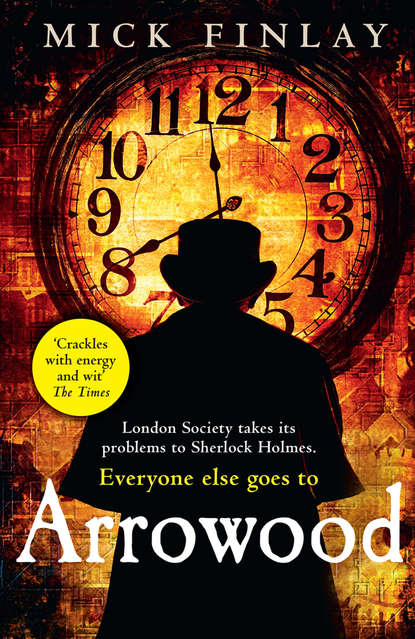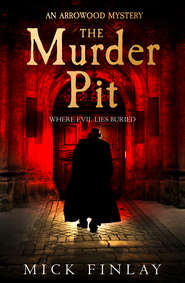По всем вопросам обращайтесь на: info@litportal.ru
(©) 2003-2024.
✖
Arrowood
Автор
Год написания книги
2019
Настройки чтения
Размер шрифта
Высота строк
Поля
‘I’ve been thinking about this man,’ he continued. ‘First, there’s his precision. He hurries to the church, delivers three deadly blows and runs into the crowd. He leaves nothing, no clues, no knife. He’s rapid and careful, so we can assume it isn’t an act of passion. Neither was it robbery. A robber wouldn’t choose a poor girl as his victim, not in daylight, and not on a busy street.’
‘He wouldn’t have time to search her pockets.’
‘Quite so.’ He puffed on his pipe and thought. ‘And his clothes. He wears a winter coat when it’s summer. It’s too big for him. Therefore he’s either a man of little means or in disguise. Tell me, as you chased, did he look back?’
‘Not once. I had my eyes on him all the time until I lost him. I only saw the side of his face as he turned the corner.’
‘He didn’t turn his head once to determine whether he was pursued?’
I shook my head.
‘Tell me, if you’d murdered a person on a busy street and fled, how would you feel?’
‘My blood would be up, I suppose. I’d be anxious not be caught.’
‘Yes, yes, and would you turn your head to see if you were being pursued?’
‘I reckon so.’
‘You wouldn’t be able to stop your head turning, Barnett. Your strong emotions would make you do it. This man isn’t like you. He’s used to controlling his emotions. So what is he? A hired assassin? A police officer?’
‘A soldier?’
He nodded, placing his pipe in the ash dish and pushing himself out of the chair.
‘That’s a start. And now we’ll go and visit Lewis. I don’t want to be here when Ettie resumes her reorganization of my life, and you’d better not be here either else she’ll begin on yours.’
Lewis Schwartz was the proprietor of a dark weaponry shop not far from Southwark Bridge. It was where people came with pistols and shotguns they desired to sell; it was where people came when they needed to buy some self-protection. It wasn’t a business I’d have wished to be in: I could only imagine the criminals who came and went from this boutique, but Lewis was as solid and unaffected by the danger of his trade as the river walls that seeped their yellow pus into the bricks of his dark shop. He was a fat man with one missing arm and stringy grey hair that fell onto his grimy collar. The guvnor and him were old friends. He used to go to Lewis when he needed information for the newspaper and, since we’d become private agents, he continued to help us from time to time. The guvnor always brought a packet of mutton or roasted beef or a bit of liver from the cookshop, which he would slap on the little table foul with grease. I was in the habit of standing back on these occasions, just as I did now, my mind imagining all the diseases whose traces could no doubt be found on the mud-black hands of our friend.
Today, Lewis ate carefully, chewing on one side of his mouth only.
‘You got tooth problems?’ I asked him.
‘One of the devils is playing me up.’
‘Let me see,’ demanded the guvnor.
Lewis opened his mouth and tipped back his head. The guvnor winced.
‘That tooth is black. You must have it pulled.’
‘I’m mustering my courage.’
‘Sooner the better,’ said the guvnor.
It was only when the beef was finished, and the fingers wiped on the trousers of these two old friends, that the guvnor fished in his waistcoat pocket and pulled out the bullet.
‘Any idea who might use a bullet such as this, Lewis?’
Lewis put on his eyeglasses and held it under the lamp.
‘Very nice,’ he murmured, turning the bullet this way and that, rubbing its shaft with his fingers. ‘It’s a .303. Smokeless. But how did you come by something like this, William?’
‘A dying girl gave it to me,’ said the guvnor. ‘A young innocent girl, murdered before our eyes. And we mean to find out who killed her. Do you know what type of gun it’s from, Lewis?’
‘The new Lee-Enfield repeating rifles.’ Lewis handed the bullet back. ‘Military rifles, only issued to a few regiments so far. This is no huntsman’s rifle. She must have got it from a soldier. Did she have a sweetheart?’
‘He was no soldier.’
‘Then another man. Was she a whore, William?’
‘She was not a whore!’ cried the guvnor.
Lewis looked at him in surprise.
‘Why are you angry?’ he asked. ‘Did you know her?’
‘I don’t understand why everyone assumes she was a whore. She worked in the Barrel of Beef.’
‘She might have been given it by a customer,’ I said, understanding that the guvnor had attached the same purity to Martha as he attached to his wife.
‘Why would a customer give a girl a bullet?’ asked Lewis, his nose twitching. ‘A tip, now that would be one thing. But why a bullet?’
The guvnor shook his head and stood.
‘That’s what we have to find out,’ he said.
As we reached the door, a match flared. The guvnor turned back. Lewis sat hunched in his chair at the back of the shop, surrounded by boxes of bullets and sheaves of gunpowder, a glowing pipe in his mouth.
‘One day you’ll blow yourself up,’ the guvnor said to his friend. ‘I’ve warned you about this for years. Why do you never listen?’
Lewis waved him away.
‘If I started to worry now I’d have to sell up this shop and become a potato-man,’ he said. ‘You should see some of the individuals I have to deal with. One spark and they would explode themselves. Next to them, this is nothing.’
*
Late that night, we waited in Mrs Willows’ coffeehouse. I watched the street outside ebb and flow in the mud and the brown rain, the night-time people stagger and shriek, the horses clop by, their heads low and weary. Midnight passed and the dark new day took its place outside the grimy window. The guvnor read the newspapers like a glutton. He started with Punch, stowing Lloyd’s Weekly and the Pall Mall Gazette under his thighs. On the next table, a thin fellow with the uniform of an undertaker ate a packet of whelks and watched him unhappily, waiting for the chance of a read before he wandered home. But the guvnor took his time, reading every column, every page, then just when it seemed he was finished he went back to the beginning and began scanning the columns again.
‘Look at this, Barnett,’ he said, holding up a cartoon. It was of a tall Irish peasant holding a knife over a cringing English gentleman. The caption read: The Irish Frankenstein. ‘They’re printing these cartoons again. You see what they do? The Irish have monkeys’ faces, covered in hair. The Englishman is defenceless. Good God, why does this never change? Why will they not see our own aggression?’
‘I suppose they don’t want to see it, sir.’
The undertaker cleared his throat and nodded at the paper. The guvnor lit his pipe, then without a word thrust the paper at the man, before lifting his leg and continuing on to the Gazette.
Finally, the door swung open and in walked our man. He stood in the doorway, his long thin arms protruding from a brown woollen coat that was too long in the body and too short in the limbs. His yellow hair was tucked into a grey cloth cap pulled down over his ears. He looked at the undertaker, at Mrs Willows standing in the door to the kitchen, then at us. His black eyebrows twitched.
‘Mr Harry,’ I said, standing. ‘This is Mr Locksher. Have a sit down. You want a coffee?’






